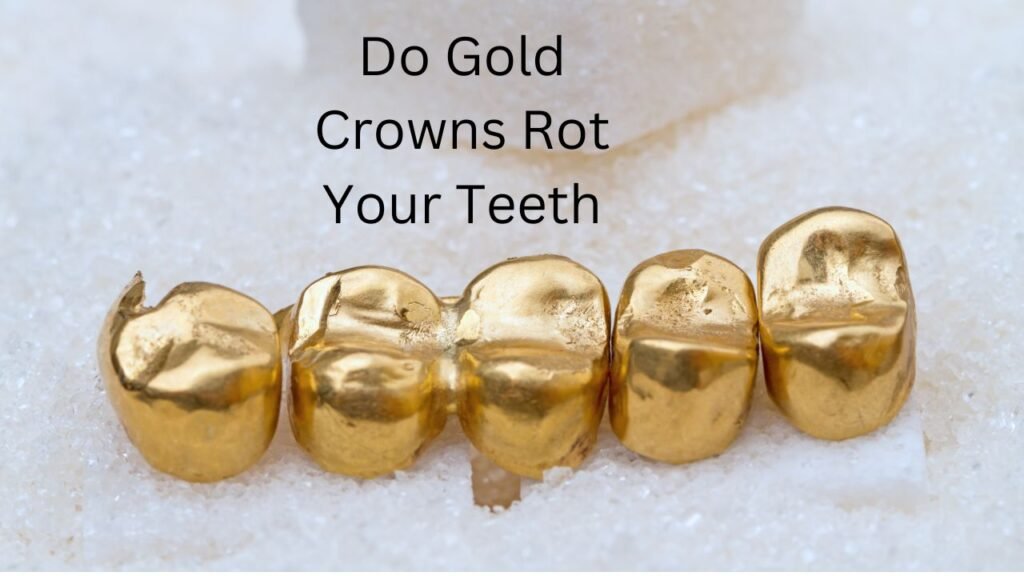Ever wondered if gold crowns can lead to tooth decay? You’re not alone! Many people with gold crowns worry about their long-term impact on dental health. If you’re considering getting a gold crown or already have one, you might be concerned about whether it could cause cavities.
This comprehensive guide will address these concerns, clear up misconceptions, and provide you with essential tips for maintaining your oral health with gold crowns.
The Benefits of Gold Crowns
Gold crowns have been a staple in dentistry for decades, and for good reason. Here’s why they’re a top choice for many patients:

1. Exceptional Durability:
Gold crowns are renowned for their durability. Unlike other materials, gold can withstand significant chewing forces without chipping or cracking. This makes them especially ideal for molars and back teeth, where the pressure from chewing is the greatest.
2. Long-Lasting:
When properly cared for, gold crowns can last several decades. This longevity is a significant advantage, as it means fewer replacements and long-term cost savings.
3. Minimal Tooth Reduction:
Gold crowns require less removal of your natural tooth structure compared to other types of crowns. This helps preserve more of your natural tooth, which is always preferable.
4. Biocompatibility:
Gold is highly biocompatible, meaning it’s less likely to cause allergic reactions or irritate your gum tissue. This makes it a suitable option for most patients.
5. Antibacterial Properties:
Some gold alloys have antibacterial properties that can help reduce bacterial growth around the crown. This is an added benefit in maintaining oral health.
6. Less Aesthetic Appeal:
Gold crowns are less natural-looking compared to porcelain crowns, which may be a consideration if aesthetics are a major concern. However, for back teeth, where visibility is less of an issue, this is often a non-factor.
Do Gold Crowns Cause Tooth Decay?
The Short Answer: No, gold crowns themselves do not cause tooth decay. In fact, they can help protect your tooth from further damage. Here’s a closer look at how gold crowns impact tooth health:
How Gold Crowns Prevent Decay:
- Sealing the Tooth:
A well-placed gold crown creates a tight seal over your tooth. This seal is crucial because it prevents bacteria and plaque from penetrating the tooth structure beneath the crown, which is a primary cause of decay. - Strengthening the Tooth:
By covering and reinforcing the tooth, gold crowns help protect it from additional wear and tear. This protection reduces the likelihood of tooth damage and decay.
When Problems Can Arise:
While gold crowns themselves don’t cause decay, certain issues can still lead to problems:
- Poor Oral Hygiene:
If you don’t maintain good oral hygiene, plaque can build up around the edges of the crown. This plaque can harbor bacteria that lead to decay around the crown’s margins. - Leaking or Loose Crowns:
Over time, a crown can become loose or develop gaps due to wear or improper placement. These gaps can allow bacteria to enter and cause decay.
Preventing Decay Around Your Gold Crowns
To ensure your gold crowns continue to protect your teeth, follow these preventive measures:
- Brush Twice Daily:
Use a soft-bristled toothbrush and fluoride toothpaste to brush your teeth twice a day. Make sure to clean around the edges of the crown thoroughly. - Floss Daily:
Flossing is crucial for removing plaque and debris from between your teeth and around the crown. Daily flossing helps prevent plaque buildup and keeps your gums healthy. - Regular Dental Checkups:
Visit your dentist every six months for professional cleanings and evaluations. Regular checkups help catch any issues early and ensure your crowns are in good condition. - Use Mouthwash:
An antimicrobial mouthwash can help reduce bacteria in your mouth, offering extra protection against decay. - Avoid Hard Objects:
Don’t use your teeth to open packages or chew on hard objects like ice. This prevents damage to your crowns and teeth. - Maintain a Healthy Diet:
A diet low in sugar reduces the risk of bacterial growth and decay. Focus on eating balanced meals and limiting sugary snacks and beverages.
Alternatives to Gold Crowns
While gold crowns offer excellent durability, other options might be better suited to your needs:
- Porcelain Crowns:
Porcelain crowns blend seamlessly with your natural teeth, making them an excellent choice for visible areas. However, they are less durable than gold and may chip or crack more easily. - Porcelain-Fused-to-Metal (PFM) Crowns:
PFM crowns combine the strength of metal with the aesthetics of porcelain. They offer a good balance between durability and appearance, though the metal can sometimes be visible at the gum line. - Zirconia Crowns:
Zirconia crowns provide a strong and natural-looking alternative. They are highly durable and offer excellent aesthetics without the metal base.
Choosing the Right Crown:
The best crown material depends on your individual needs and preferences. Consult with your dentist to determine the most suitable option for your specific case.
Conclusion
So, do gold crowns rot your teeth? The answer is no! Gold crowns are a reliable and long-lasting dental restoration option. They offer many benefits, including durability and biocompatibility, while helping to protect your tooth from decay. By practicing good oral hygiene and scheduling regular dental visits, you can ensure your gold crowns remain healthy and effective.
If you’re considering gold crowns or already have them, talk to your dentist about your options and create a personalized oral care plan. This will help you maintain your crowns and overall dental health.
Disclaimer:
This blog post provides general information and is not a substitute for professional dental advice. Always consult with your dentist to determine the best course of treatment for your specific needs.
Find Your Perfect Dentist
Easily book appointments with top-rated dentists in your area
Need Emergency Dental Care?
Get immediate help from verified dental professionals